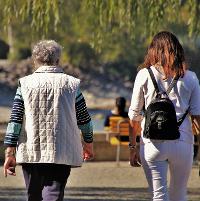China is a patrilinear society profoundly influenced by Confucian norms, where caring for older parents has traditionally been seen as the responsibility of sons and daughters-in-law. However, an increasing number of parents receive care from daughters as a result of women's empowerment (Gruijters and Ermisch, 2018) and China’s One-Child Policy which reduced the availability of sons. Two of our recent research projects here at the Institute of Population Ageing examined the health outcomes of eldercare provided by sons and daughters (Zhang and Harper, 2022a;2022b).
In these projects we analysed multiple waves of the China Health and Retirement Longitudinal Study (CHARLS) with multivariate regressions, we compared the self-reported physical and mental health status of parents with different care sources: sons (or daughters-in-law), daughters (or sons-in-law), both daughter and son care, and other forms of care. Our findings suggested that the self-reported physical and mental health status of parents was better if they were cared for by their son(s) than their daughter(s). We argued that this gendered impact of eldercare provided by children can be explained through the enduring son-preference, as well as on-going gender difference in socioeconomic status.
Let’s unpack this a little. A consequence of insufficient pension schemes and a lack of other social securities, older adults in China rely on their children financially, emotionally and physically to a great extent (Li, 2020). The quality of eldercare provided by children is an essential determinant for older parents' well-being and is closely linked to the financial capacity of the caring offspring. This significant gender difference in not just income but also socioeconomic status more broadly is very much evident in the literature (Xie and Hannum, 1996). It means that sons may be more financially capable than daughters to support their parents. With better living environments and access to healthcare, older adults will have better health. When faced with the obligation to care for their parents, sons may also feel a normative expectation and indeed responsibility to care for their older parents.
Furthermore, care from culturally appropriate sources is of great importance to older adults' well-being and affects their relative status amongst peers (Cong and Silverstein, 2008). In other words, many older parents feel that their sons should care for them (typically through providing a daughter-in-law to care for his parents on marriage). If they do not have sons, or the son does not provide care and daughters step in, the older parents may see this as a negative, and this may impact on the self-reported physical and mental health status.
Such gendered impact of eldercare is more significant amongst older parents who have a higher level of dependency on their children and those with a stronger son preference; rural residents, mothers, and parents with few resources. There are significant inequalities in access to healthcare services, infrastructure, and the broader facilities made available through general economic development across rural and urban areas (Cai and Yue, 2020). The One-Child Policy was also differentially implemented in urban and rural areas, where rural couples were allowed to have a second child if the first one was a girl. All of these factors contribute to making parents living in rural areas more dependent on their children, and giving them with a stronger cultural son preference.
In addition, compared to women, men are more likely to receive support and companionship from their partners due both to the gender differences in life expectancy (United Nations, 2019), and the gendered division of labour. Mothers are traditionally more dependent on their children when compared to fathers, especially during the ‘widowhood’ stage of the life course. Adults entering their more senior years with sufficient wealth are typically more able to afford high-quality healthcare and social care services. With a higher level of financial independence, their life quality is less reliant on the financial capacities and filial pieties of their (former) dependents.
Our important work exposes vital inequalities in health statuses amongst parents with different sources of care.
This research thus leads to some policy recommendations. Improving the financial independence of older adults through the development of a comprehensive social security system – such as healthcare and pension systems – remains imperative. The Chinese government has launched a series of reforms which ensure a national coverage of health insurance schemes (Pan, Xue and Meng, 2016). The Urban Employment Basic Medical Insurance (UEBMI), the New Corporate Medical Scheme (NCMS), and the Urban Residents Basic Medical Insurance (URBMI) programs, were implemented in 1998, 2003 and 2007 accordingly. In order to reduce inequalities across access to healthcare services among rural and urban areas, the NCMS and the URBMI were merged and replaced by the Urban and Rural Residents Basic Medical Insurance (URRBMI). In 2015, a universal non-contributory pension scheme was launched to cover urban non-employed and all rural residents. Despite this magnificent progress regarding the development (and harmonisation) of national health insurance and pension schemes, the current benefit levels are still deficient and inequalities still persist (Liu and Sun, 2016).
Developing the long-term care system is also recommended. Currently, the provision of formal care services for the aged population in China remains extremely scarce. In 2017, there were 132,800 nursing home beds in Shanghai – the most developed city in mainland China – with 32.9 beds per 1,000 older persons (Luo et al., 2018). Low quality of care, low-skilled workers, limited types of services, and a general lack of affordability impede the development of the long-term care system (Li and Han, 2016). Another important factor challenging the system's sustainability is the older adults' reluctance to live in the nursing home or use other formal care services.
The majority of older Chinese parents still prefer family care because of deeply rooted cultural norms, and a general lack of reliable and affordable care services. A national study in China for example has shown that only 16.7% and 20% of older adults in rural and urban areas were willing to live in a nursing home (Chou, 2010). Increasing the acceptance of external care reduces older adults' dependence on their children and alleviates the negative well-being impact of the absence of care from sons. Against this backdrop of reducing family size and increasing demand for eldercare, it is critically urgent for us to thoroughly understand the needs and the experience of older adults in order to promote a healthier ageing progress.
About the Author
Dr Yanan Zhang is a Research Fellow on the DAI@Oxford Programme with a quantitative focus. Her role involves the creation of an evidence base for positive interventions in support of population ageing.
Opinions of the blogger is their own and not endorsed by the Institute
Comments Welcome: We welcome your comments on this or any of the Institute's blog posts. Please feel free to email comments to be posted on your behalf to administrator@ageing.ox.ac.uk or use the Disqus facility linked below.













